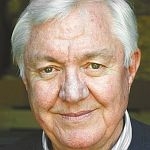 (Host) In his thirty plus years as ABC News diplomatic and foreign correspondent, commentator Barrie Dunsmore traveled with American presidents and secretaries of state and met many world leaders. He also had the good fortune to interact with an international cultural icon who died recently.
(Host) In his thirty plus years as ABC News diplomatic and foreign correspondent, commentator Barrie Dunsmore traveled with American presidents and secretaries of state and met many world leaders. He also had the good fortune to interact with an international cultural icon who died recently.
(Dunsmore) The New York Times obituary of author and social critic Gore Vidal got one of his most publicized putdowns wrong. The Times said that during the ABC News coverage of the 1968 Democratic convention, Vidal had called fellow guest commentator William Buckley a crypto-fascist. Buckley was not amused. He used a nasty sexual put-down to describe Vidal and threatened to punch him out. (So much for the high-minded televised discourse of two of the most patrician men of letters of their day.) Actually, Vidal called Buckley a crypto-Nazi, and the Times later corrected the mistake. Vidal would have been pleased.
In 1968 I was the Rome Bureau Chief for ABC News and sat in on the negotiations in which Vidal, who lived in Italy, was hired to appear with Buckley on the network’s coverage of both parties’ conventions and the November election. He was also to do commentaries for the ABC evening news – and I was to be Vidal’s editor.
Gore Vidal was among the most erudite and successful authors of his era: with the ground-breaking 1948 novel The City and the Pillar, which dealt openly with male homosexuality; the powerful historical novel about Roman Emperor Julian the Apostate; the controversial biographies of Aaron Burr and Abraham Lincoln. But his TV work needed serious editing. He’d come in with seven or eight minutes, which I would slash down to a minute thirty – and, remarkably, he accepted this without so much as a whimper.
Vidal was related through marriage to Jackie Kennedy, but Bobby Kennedy had him ostracized from the White House because of his sexual orientation. He resented Bobby for this, but when I gave him the news Bobby had been killed he was deeply moved.
I remember Vidal holding forth with me on Ronald Reagan, then California governor and possible Republican presidential candidate in ’68. Vidal said that being a screen actor was the worst possible training for a president – because screen acting is basically passive. Actors sit around for hours waiting to say a line or two and then do just what the director tells them. Vidal recalled that in the early 1960s, when he was casting the movie version of his Broadway play The Best Man – which was for its time, a rare, candid look at American presidential politics – Reagan’s agent tried very hard to get him the role that eventually went to Henry Fonda. Vidal said he told the agent, “Reagan is not a credible presidential candidate.” He then chuckled and said to me, “So much for my powers of prognostication.” At my urging, he made this the subject of a commentary – which ABC liked very much, as did Time Magazine, which published an item about it.
Over the years I occasionally saw Vidal socially when he would visit Washington. He was always engaging – and he never lost his edge. We were not close friends, but he was certainly one of my more notable acquaintances.